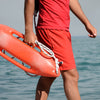Staying Vigilant: Tips for Lifeguards to Remain Alert and Sharp on Duty
The role of a lifeguard demands unwavering attention, quick reflexes, and an acute sense of awareness. Staying alert and sharp while on duty is paramount for ensuring the safety of individuals in aquatic environments. In this blog, we’ll explore essential tips and practices that lifeguards can employ to maintain vigilance and readiness during their shifts.
Tips for Lifeguards to Stay Alert and Mentally Sharp:
1. Regular Scan of Assigned Area:
• Lifeguards should consistently scan their designated zone. Regular and systematic scanning enables them to identify potential risks or distressed swimmers promptly.
2. Avoiding Distractions:
• Limiting distractions is crucial. Lifeguards should refrain from using personal electronic devices or engaging in conversations that divert their attention away from their primary duty.
3. Maintaining Physical Fitness:
• A physically fit body supports mental alertness. Lifeguards should prioritize regular exercise and proper nutrition to sustain energy levels and mental sharpness during long shifts.
4. Rotation and Change of Position:
• Changing positions periodically helps prevent monotony and reduces the risk of becoming complacent. Rotating positions allows for fresh perspectives and minimizes the chance of overlooking potential dangers.
5. Continuous Training and Skill Refinement:
• Lifeguards must undergo regular training to stay updated with rescue techniques and first aid protocols. Continuous learning enhances confidence and readiness in responding to emergencies.
6. Stay Hydrated and Take Breaks:
• Proper hydration is vital. Lifeguards should drink water regularly and take short breaks to avoid fatigue, ensuring they remain focused and alert throughout their shifts.
7. Utilize High-Visibility Gear:
• Wearing high-visibility attire helps lifeguards remain easily identifiable. This facilitates quick recognition by beach or pool visitors in need of assistance.
8. Practice Mindfulness and Mental Alertness:
• Remaining mentally present and aware is crucial. Lifeguards can practice mindfulness techniques, such as focused breathing or staying mentally engaged with their surroundings.
9. Stay Updated with Weather Conditions:
• Awareness of changing weather conditions is essential. Lifeguards should stay informed about weather forecasts and be prepared to adapt to changing situations.
10. Team Communication and Coordination:
• Effective communication among lifeguard teams enhances vigilance. Clear and concise communication ensures a collective effort in maintaining a safe environment.
The Importance of Alertness in Lifeguarding:
1. Emergency Response:
• Staying alert is pivotal in facilitating swift responses to emergencies. Immediate action is crucial in rescuing distressed swimmers or addressing potential hazards.
2. Preventive Measures:
• Being alert allows lifeguards to anticipate potential risks and take preventive measures, thereby reducing the likelihood of accidents or water-related incidents.
Conclusion:
Remaining vigilant and sharp while on duty is a cornerstone of the lifeguard’s responsibility. By following these tips and implementing practices that prioritize alertness, lifeguards ensure they can respond effectively to emergencies, maintain a safe environment, and uphold their commitment to safeguarding the lives of individuals enjoying aquatic settings. Maintaining an unwavering sense of awareness is not only a duty but also a testament to the dedication and professionalism of lifeguards in ensuring water safety.
Tips for Lifeguards to Stay Alert and Mentally Sharp:
1. Regular Scan of Assigned Area:
• Lifeguards should consistently scan their designated zone. Regular and systematic scanning enables them to identify potential risks or distressed swimmers promptly.
2. Avoiding Distractions:
• Limiting distractions is crucial. Lifeguards should refrain from using personal electronic devices or engaging in conversations that divert their attention away from their primary duty.
3. Maintaining Physical Fitness:
• A physically fit body supports mental alertness. Lifeguards should prioritize regular exercise and proper nutrition to sustain energy levels and mental sharpness during long shifts.
4. Rotation and Change of Position:
• Changing positions periodically helps prevent monotony and reduces the risk of becoming complacent. Rotating positions allows for fresh perspectives and minimizes the chance of overlooking potential dangers.
5. Continuous Training and Skill Refinement:
• Lifeguards must undergo regular training to stay updated with rescue techniques and first aid protocols. Continuous learning enhances confidence and readiness in responding to emergencies.
6. Stay Hydrated and Take Breaks:
• Proper hydration is vital. Lifeguards should drink water regularly and take short breaks to avoid fatigue, ensuring they remain focused and alert throughout their shifts.
7. Utilize High-Visibility Gear:
• Wearing high-visibility attire helps lifeguards remain easily identifiable. This facilitates quick recognition by beach or pool visitors in need of assistance.
8. Practice Mindfulness and Mental Alertness:
• Remaining mentally present and aware is crucial. Lifeguards can practice mindfulness techniques, such as focused breathing or staying mentally engaged with their surroundings.
9. Stay Updated with Weather Conditions:
• Awareness of changing weather conditions is essential. Lifeguards should stay informed about weather forecasts and be prepared to adapt to changing situations.
10. Team Communication and Coordination:
• Effective communication among lifeguard teams enhances vigilance. Clear and concise communication ensures a collective effort in maintaining a safe environment.
The Importance of Alertness in Lifeguarding:
1. Emergency Response:
• Staying alert is pivotal in facilitating swift responses to emergencies. Immediate action is crucial in rescuing distressed swimmers or addressing potential hazards.
2. Preventive Measures:
• Being alert allows lifeguards to anticipate potential risks and take preventive measures, thereby reducing the likelihood of accidents or water-related incidents.
Conclusion:
Remaining vigilant and sharp while on duty is a cornerstone of the lifeguard’s responsibility. By following these tips and implementing practices that prioritize alertness, lifeguards ensure they can respond effectively to emergencies, maintain a safe environment, and uphold their commitment to safeguarding the lives of individuals enjoying aquatic settings. Maintaining an unwavering sense of awareness is not only a duty but also a testament to the dedication and professionalism of lifeguards in ensuring water safety.
- Posted in Lifeguard Bathing Suit, Lifeguard Board Shorts, Lifeguard Outfit, Lifeguard Shorts, Lifeguard Swimsuit, Lifeguard Swimwear

